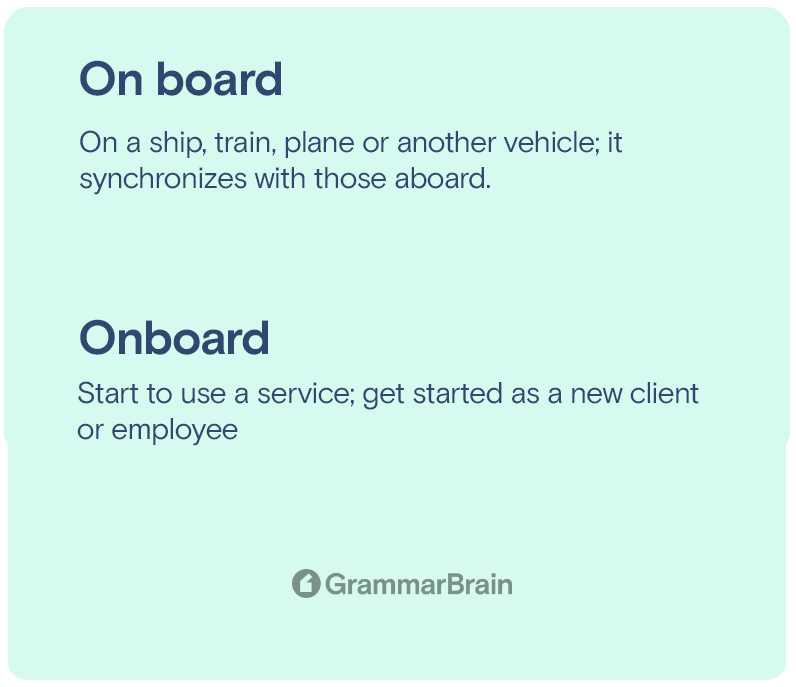Is it onboard or on board? “Onboard” means allowing a smaller unit to be a part of a bigger circuit. It is normally used in the case of hiring a potential candidate into an organization. As an example, this data has huge potential in helping to onboard new hires and manage their performance.
Differences between Onboard vs. On Board
Verb: Onboard
Start to use a service; get started as a new client or employee
Adverb: On Board
On a ship, train, plane or another vehicle; it synchronizes with those aboard.

Understanding the meaning of Onboard and On Board
“Onboard” is a verb, which implies following some procedures to be a part of a new organization. It also means getting familiar with the rules, policies, rituals, policies, and services of the new place.
On another hand, “On Board” gives an extra meaning to this verb. As if the new hire is finally on board with us. It is an informal way of using the verb “onboard”.
What does onboarding mean in business?
Onboarding is to acquaint the new employees with how their experience and skills match the requirements of the company. They are oriented by the human resource department about the possibilities they will come across.
Every department within the company has to commit to onboarding new employees and adjudicate a realistic plan of action.
Sorting it further with examples
When a person is safe aboard a vessel, or a ship, or an organization – they are onboard or on board?
Cutting the crap, both words onboard and onboard have similar meanings but these are used in different situations. In case you are still confused, let’s dig it out further.
When to use it?
On board is a prepositional phrase. It acts as an adverb or a function in sentences. It means present, in agreement. Consider examples, (1) Shalby often gets seasick while on board a sea ship; In yet another instance, (3) Shalby often gets seasick while she is onboard.
Got the difference?
On board has a synonym, which is aboard. It can be more flexibly used according to the context and instance. But both mean the same thing.
When to use onboard?
It can be used as an adjective or a verb according to the need. As an adjective, onboard implies being attached, or integral. Examples: An onboard computer is hardware/software that is inbuilt into a vessel/ship/aircraft. Similarly, Rohit bought a new car and he was careful to select one with an onboard GPS to help him navigate.
The onboard navigational system helped the pilots to select the shortest and the fastest route without wasting much time and fuel.
“Onboard” can also be used as a verb. In its easiest form, hiring a new employee is the most common example. Onboard always appears before the noun it modifies. The phrase “on board” is used after a verb. As an example: The directors’ decision to implement an online application tool will significantly streamline the onboarding process. Another example: The new onboarding process replaces manual mentoring of employees with an extensive library of poorly structured training videos.
Should onboard be hyphenated?
Normally we see the one word onboard, but it may sometimes appear as a compound word (or hyphenated compound): on-board. Spellcheck apps often indicate it as an error but that can always be bypassed for a higher good.
Inside this article
Fact checked:
Content is rigorously reviewed by a team of qualified and experienced fact checkers. Fact checkers review articles for factual accuracy, relevance, and timeliness. Learn more.
Core lessons
Glossary
- Abstract Noun
- Accusative Case
- Anecdote
- Antonym
- Active Sentence
- Adverb
- Adjective
- Allegory
- Alliteration
- Adjective Clause
- Adjective Phrase
- Ampersand
- Anastrophe
- Adverbial Clause
- Appositive Phrase
- Clause
- Compound Adjective
- Complex Sentence
- Compound Words
- Compound Predicate
- Common Noun
- Comparative Adjective
- Comparative and Superlative
- Compound Noun
- Compound Subject
- Compound Sentence
- Copular Verb
- Collective Noun
- Colloquialism
- Conciseness
- Consonance
- Conditional
- Concrete Noun
- Conjunction
- Conjugation
- Conditional Sentence
- Comma Splice
- Correlative Conjunction
- Coordinating Conjunction
- Coordinate Adjective
- Cumulative Adjective
- Dative Case
- Determiner
- Declarative Sentence
- Declarative Statement
- Direct Object Pronoun
- Direct Object
- Diction
- Diphthong
- Dangling Modifier
- Demonstrative Pronoun
- Demonstrative Adjective
- Direct Characterization
- Definite Article
- Doublespeak
- False Dilemma Fallacy
- Future Perfect Progressive
- Future Simple
- Future Perfect Continuous
- Future Perfect
- First Conditional
- Irregular Adjective
- Irregular Verb
- Imperative Sentence
- Indefinite Article
- Intransitive Verb
- Introductory Phrase
- Indefinite Pronoun
- Indirect Characterization
- Interrogative Sentence
- Intensive Pronoun
- Inanimate Object
- Indefinite Tense
- Infinitive Phrase
- Interjection
- Intensifier
- Infinitive
- Indicative Mood
- Participle
- Parallelism
- Prepositional Phrase
- Past Simple Tense
- Past Continuous Tense
- Past Perfect Tense
- Past Progressive Tense
- Present Simple Tense
- Present Perfect Tense
- Personal Pronoun
- Personification
- Persuasive Writing
- Parallel Structure
- Phrasal Verb
- Predicate Adjective
- Predicate Nominative
- Phonetic Language
- Plural Noun
- Punctuation
- Punctuation Marks
- Preposition
- Preposition of Place
- Parts of Speech
- Possessive Adjective
- Possessive Determiner
- Possessive Case
- Possessive Noun
- Proper Adjective
- Proper Noun
- Present Participle
- Prefix
- Predicate



